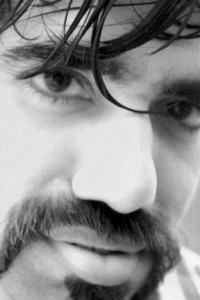Creative Director Moeed Tariq sat down with artist Mohsin Shafi to talk about the dimensions of his work and what the artistic landscape of Pakistan is shaping up to be.
Have you always known you wanted to be an artist?
Yes. As far back as I can remember, I was in the habit of locking myself up in a room and draw all day long to the soundtrack of my father repeatedly claiming that I would never amount to anything in life. I suppose I’m still very much in the habit of doing except that daddy dearest has now somewhat made his peace with what I do.
Would you ever think about doing something else for a living?
Perhaps a poet, poetry was the donor twin to my visual arts growing up. It sort of dwindled away into malnourishment along the way but if I could, that’s the one thing I would like to go back to and perhaps make the centre of my life.
What’s a normal day in your life like?
Bitch. Bitch. Bitch some more because I’m bitter.
Your work plays with the idea of identity and perception, how’s that working out for you?
I know it sounds very run-of-the-mill but I am realizing that my work and where it’s coming from is helping me realize and figure things out like my own identity, my sexuality and where I stand in the grander scheme of things. Relentless, occasionally fruitful questioning is what it is (smiles).
Where do you draw your inspiration from?
I have been an almost unnaturally observant person, always. And now it’s come to a point that my work has everything to do with what’s around me. Whatever I see that I cannot digest, I regurgitate through my work. I guess you could say it’s in an attempt to provoke others around me into a revolution of sorts to herald change and take a stand against all that is so awfully wrong around us today.
My inspirations are deeply rooted in myself. I’m trying to search for inspiration every day: To reach for the deep feelings hidden below the surface of appearances, to pull them out from behind the shadows of everyday life. It is a permanent record of fleeting sensations. Through a play with image, text, material, medium and milieu, I attempt to communicate multiple layers of meaning. I’d rather pose more questions than provide answers and hopefully, in turn create a deeper dialogue to expose the grey areas that become overshadowed by black and white moral codes.
I use items from everyday life; the worn and used, items that convey news. A drawerful of odds and ends, treasure chests of humanity that allows us to read a book in focus; newspaper clippings. They are all unique, even [the seemingly] ordinary.
How much of yourself do you put into your work?
A lot. I’ve never actually sat down and gauged it precisely though. It’s always about me stepping into another person’s shoes to try and grasp how they feel and react to their surroundings. As for putting my own self and me alone into my work, it’s been a struggle. But I’m getting around that through the use of personal metaphors in my work.
Are there any artists that you admire?
This could be a very long list but off the top of my head Afshar Malik, Anwar Saeed, Asim Butt and Naiza Khan (her drawings).
It is often said that an artist has no living, how true have you found that to be living and working in Pakistan?
To be honest I actually think it’s easier getting away with being one here than anywhere else in the world. Besides the fact that you have to be in the art circles to be given exhibition opportunities and be well known but other than that, it’s not really that bad here. The supplies are cheaper, there’s the home support base to let you work (for those who chose to avail it) and generally just more time to simply be an artist working away. The only difficulty mostly faced here is breaking into the ‘right’ lobbies here. Your entire future in art depends on who you know and where they let you go. If it weren’t for that major crippling factor, there’s not much to hold an artist back in this part of the world.
How would you collectively describe your work in your own words?
The affair that inspires my work transforms the common and the everyday into the disputed and the unreal and creates in the process a loaded, often perplexing world that is at once familiar and bizarre.





